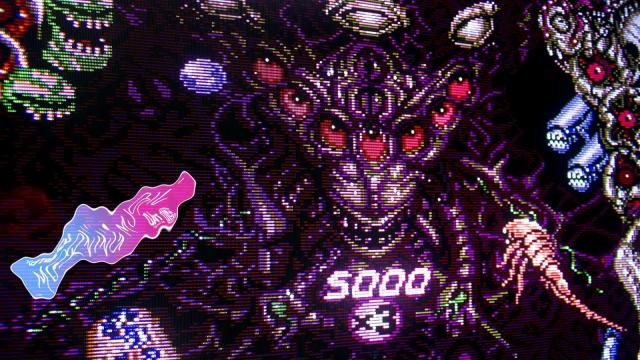Welcome to Morning Music, Kotaku’s new, daily hangout for folks who love video games and the cool-arse sounds they make. Today we’ll hit our first PC Engine / TurboGrafx-16 chip soundtrack, the brief but memorable Alien Crush. Weird pinball! (That was my nickname in high school.)
In theory video games and pinball are a great combination, with video opening the door to fantastical table concepts that just wouldn’t fly in mundane reality. The tough part’s often getting the physics right. 1988’s PC Engine hit Alien Crush (longplay) may have been the first video pin to hit the sweet spot, offering both one-of-a-kind aesthetics (fleshy, pulsating tables swarming with squirmy, Gigeresque aliens) and fun, actually decent ball physics.
(In writing this I’ve learned Alien Crush is actually winnable if you reach 1 billion points. The scariest part of the game is that takes about 40 hours, apparently, and results in the most cursory of ending sequences. The win conditions for future sequels like Devil’s Crush and Jaki Crush seem much more plausible.)
Alien Crush has some sweet music, composed by Toshiaki Sakoda. It’s small in quantity but succeeds in building a strange, fittingly spooky atmosphere. This is the first internal TurboGrafx-16 sound-chip music we’re sampling, so we’ll hear how it differs from its NES and Mega Drive contemporaries.
Let’s listen:
The two main gameplay tracks are “Lunar Eclipse” (0:54) and “Demon’s Undulate” (1:57), and they’re nice enough accompaniment. Other non-incidental tracks include “The Best Five” (5:38, high score entry), “Bonus Stage 1” (2:59) and my favourite, the downbeat, kind of Phantasy Star II-sounding “Bonus Stage 2” (3:44). Unfortunately this YouTube upload, while high quality, doesn’t let the songs loop, so you’ll just have to click back to the song’s start or imagine the proper looping. I mourn for “Bonus Stage 2,” robbed of its full mood-altering effect (here it is in action).
As a PC Engine HuCard (TurboChip in the States) Alien Crush relied solely on the console’s internal sound capabilities, which were integrated into the HuC6280 CPU. (The PC Engine’s densely integrated components were a key reason the console was able to be so adorably tiny.)
Of the popular retro console sound chips I’m least familiar with this one — feel free to chime in with your learnings and observations — but it uses the same waveform generation concept as the Famicom/NES while offering about twice as many channels, plus some special features for sample playback and limited-seeming FM synth. A nice upgrade, overall, and well-done PC Engine chip music, as in Alien Crush or Blazing Lazers, definitely has a character all its own. It’s in the same basic neighbourhood as NES music, but often noticeably fancier / more complex.
I’d like to sample more, actually, as I’ve probably played less than four or five dozen HuCard games over the years (CDs are where it’s at). The 1987 PC Engine — which folks love to point out has an 8-bit CPU — is a pretty fascinating intermediary between 1983’s Famicom and the slightly later Mega Drive (1988) and Super Nintendo (1990). It embodied qualities from both ends of that spectrum, which is evident in its audio as well. That it managed to thrive through 1994 (with help from add-ons, granted) speaks well to the intrinsic quality of its design.
Bonus round? Bonus round. The 1990 album Devil Crash / Alien Crush (YT / VGMdb) featured arrangements from Alien Crush — a mere two tracks, “Lunar Eclipse” (41:04) and “Demon’s Undulate” (44:21) — and its even more admired 1990 sequel, Devil Crash / Devil’s Crush. It’s all relatively not bad! (Though where is my damn “Bonus Stage 2”?) Lunar / Grandia fans might be interested to note that famed Game Arts musicman Noriyuki Iwadare arranged track 8’s “Devil Crash Symphony” (35:37).
Alien Crush also got a Wii revival in Alien Crush Returns (gameplay) and while I hate to be the bearer of bad news, it’s one of those listless, latter-day Hudson one-offs (developed by, uh-oh, Tamsoft) that seems middling in most respects. Including the generic music, which no one even seems to like enough to have ripped. Hrmph.
That’s it for today’s Morning Music! Share your TurboGrafx music / pinball takes down below! I really wanna stick around but I’ve got the strangest tummy ache since that crab-thing fell off my face. Uhh. Maybe I’ll see you tomorrow?

Leave a Reply